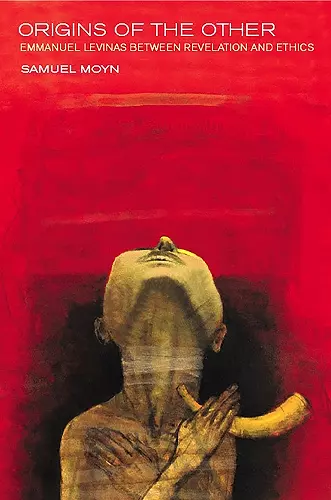Origins of the Other
Emmanuel Levinas between Revelation and Ethics
Format:Hardback
Publisher:Cornell University Press
Published:15th Nov '05
Currently unavailable, and unfortunately no date known when it will be back
This hardback is available in another edition too:
- Paperback£18.99(9780801473661)

The French-Jewish thinker Emmanuel Levinas (1906–1995) is today remembered as the central moralist of the twentieth century and remains a major presence in the contemporary humanities. In this book, written in lucid and jargon-free prose, Samuel Moyn provides a first and controversial history of the makings of his thought, and especially of his trademark concept of "the other."Restoring Levinas to the intellectually rich and combative atmosphere of interwar Europe, Origins of the Other overturns a number of views that have attained almost stereotypical familiarity. In a careful overview of Levinas's career, Moyn documents the philosopher's early allegiance to the great German thinker Martin Heidegger. Showing that Levinas crafted an idiosyncratic vision of Judaism, rather than returning to any traditional source, Moyn makes the startling suggestion that Protestant theology, as it spread across the continent in new forms, may have been the most plausible source of Levinas's core concept. In Origins of the Other, Moyn offers new readings of the work of a host of crucial thinkers, such as Hannah Arendt, Karl Barth, Karl Löwith, Gabriel Marcel, Franz Rosenzweig, Jean-Paul Sartre, and Jean Wahl, who help explain why Levinas's thought evolved as it did.Moyn concludes by showing how "the other" assumed an ethical bearing (long after its first invention) when Levinas's thought crystallized in Cold War debates about intellectual engagement and the relation of morality and politics. An epilogue relates Levinas's Totality and Infinity to current philosophical discussions in Europe and America and reflects on the difficult relationship between philosophy and religion in the modern world.
"In the refreshingly lucid Origins of the Other, Samuel Moyn aptly characterizes Levinas's approach to ethics as 'crypto-theological.' By this term Moyn highlights Levinas's intrinsic ambivalence concerning the tension between his secular, phenomenological intentions and his covert eschatological aspirations. In response to the mood of profound cultural despair provoked by World War I, the 1920s witnessed a major theological revival. It is this phenomenon, Moyn contends, that formed the crucible for Levinas's distinctive approach to ethics. One of the virtues of Moyn's book is that he discovers the origins of Levinas's notion of Otherness where few before him have thought to look."—Richard Wolin, The Nation, 20 February 2006
"Make no mistake about it: Samuel Moyn has written a blockbuster book on one of the most pivotal, yet imperfectly understood and little-scrutinized figures of twentieth-century European thought, Emmanuel Levinas. Combining erudition of rare depth and scope with uncommon stylistic elegance, Moyn narrates the formation of Levinas's concept of the Other' as occasioned by the various philosophical, and crucially, theological encounters he made along the way to his mature philosophy of ethics and intersubjectivity. The result is a riveting, highly informative account not only of the intellectual itinerary of Emmanuel Levinas but also of the principal currents of twentieth-century European thought."—Nathan Bracher, H-France, August 2006
"Intellectual history at its best should heighten the philosophical drama in a thinker's work, giving us a deeper appreciation of what is genuinely at stake in it. Samuel Moyn's study of Levinas does just that. It not only helps us understand why Levinas became such a revered figure in postwar France but also reveals what that reverence obscured—in particular, Levinas's deep debt to Jewish and, surprisingly, Christian theology. All of which raises important questions about the moral legacy of biblical religion, and how modern philosophy has and hasn't confronted it."—Mark Lilla, author of The Reckless Mind: Intellectuals in Politics
"In Origins of the Other, Samuel Moyn not only offers a novel and historically convincing portrait of Levinas that upsets received interpretations but also bridges areas of inquiry that seldom meet. In so doing he gives intellectual historians as well as philosophers a model for considering the complex interplay between historical and philosophical understanding. This is an original and superb book. It will be sure to provoke much debate about Levinas and about a fundamental issue that continues to plague much of contemporary Continental and Anglo-American political and ethical theory: whether it is possible to develop a secular humanism without recourse to theological categories."—Leora Batnitzky, Princeton University
"Emmanuel Levinas is arguably the most important ethical theorist in all of recent continental philosophy. Yet his historical origins have been poorly understood—until now. Samuel Moyn provides not only a fascinating inquiry into the sources of Levinasian ethics but also a bold and capacious look at the broader, European discourse of 'the other' that first emerged from the ferment of interwar philosophical 'crisis' among such thinkers as Franz Rosenzweig and Karl Barth. The result is a work of scholarship sober in tone yet scintillating with insight. Moyn has written nothing less than a portrait of European intellectual life in the twentieth century."—Peter E. Gordon, Harvard University, author of Rosenzweig and Heidegger: Between Judaism and German Philosophy
"Samuel Moyn has set as his task a rigorous examination of one of the most intriguing, enigmatic, and misunderstood philosophical ideas of recent times: Emmanuel Levinas's notion of 'the other.' With stunning erudition, Moyn takes the reader on a demanding intellectual journey that crosses borders at every turn—between France and Germany, European and Jewish thought, theology and philosophy, prewar and postwar intellectual cultures, and Levinas's thought and the ways in which it has been received and put to use by his followers. Moyn is at once careful and knowledgeable, intimately familiar with both sides of the border. His rich exploration forces us to rethink standard assumptions about Levinas's relationship to classical Judaism, as well as to Heidegger and Rosenzweig. All in all, Origins of the Other is a work of scholarly virtuosity and announces the arrival of a major new historian."—David N. Myers, UCLA
- Winner of Cowinner of the Morris D. Forkosch Prize (Journal.
ISBN: 9780801443947
Dimensions: 235mm x 155mm x 24mm
Weight: 907g
288 pages